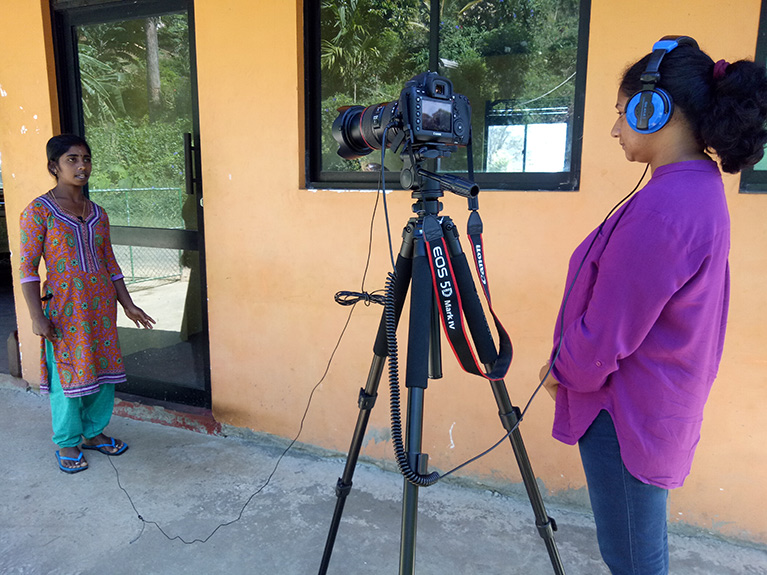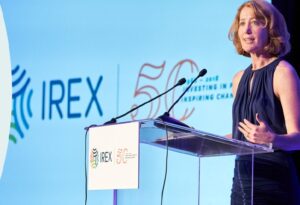Title: Analysis of USAID’s $7.9 Million Program and Its Implications for Sri Lankan Journalism

This week, a report surfaced regarding the United States Agency for International Development (USAID)’s expenditure of $7.9 million to train Sri Lankan journalists on how to avoid “binary-gendered language.” The program, which was run by IREX, a U.S.-based organization, has been met with sharp criticism. Critics, including high-profile figures such as Elon Musk, have raised concerns over the necessity and value of the initiative, questioning its alignment with the real needs of Sri Lankan journalism.
Elon Musk Criticizes USAID’s $7.9 Million Spending
Elon Musk, who now heads the Trump administration’s Department of Government Efficiency, has been vocal about the misuse of taxpayer money in foreign aid programs. He has highlighted the USAID initiative as a prime example of ineffective spending. Musk’s remarks echoed concerns shared by many critics who argue that while the world faces pressing issues like economic instability and infrastructure deficiencies, resources are being misallocated to programs that don’t directly address Sri Lanka’s most urgent challenges.
Republican Senator John Kennedy Slams
Republican Senator John Kennedy slammed USAID for funding a project to teach Sri Lankan journalists and questioned if the American tax payer would approve spending on how to avoid binary-gendered language.
Kennedy defended Elon Musk‘s work at the Department of Government Efficiency (DOGE) saying it helped reveal funds wasted by USAID.
The program was set to run until at least April 14, 2023, according to the grant summary on USASpending.gov.

The Cost of Administration: Concerns Raised by Sri Lankan Journalists
Sri Lankan journalists are also questioning the significant administrative costs involved in the MEND (Media Empowerment and Development) program. According to reports, a substantial portion of the $7.9 million was spent on overheads and administrative expenses, which some feel could have been better allocated toward more practical, hands-on journalism training. Critics, including prominent media personalities, have pointed out that IREX, the organization behind the program, took a considerable share for administration costs, leading to questions about the efficiency and effectiveness of the program’s execution.
Namal Rajapaksa Calls for Investigation into the MEND Program

In response to these growing concerns, Namal Rajapaksa, a prominent Sri Lankan politician, has called for a full investigation into the MEND program. He has requested that authorities look into the transparency of the spending and hold the parties involved accountable. Rajapaksa’s call comes amidst allegations that the program did not have the desired impact, and many of the individuals involved in the initiative are now jobless or no longer employed in the media sector.
“Given the scale of the funds involved, there must be a thorough review to ensure that such programs are delivering value for the people of Sri Lanka,” Rajapaksa stated in a recent interview. His position is rooted in the belief that government-funded programs must be transparent, efficient, and provide tangible benefits to the local population.
Defending the MEND Program: A Response to the Criticism
In defense of the MEND program, proponents argue that the initiative sought to tackle an important issue in the media landscape. The use of inclusive language, including non-binary gendered terms, is a significant aspect of modern journalism, especially in promoting diversity and reducing discrimination. The intention behind the program was not just to teach grammatical nuances but to promote social equality through language, which supporters say is critical in the evolving global narrative.
Furthermore, defenders argue that the focus on gender-sensitive language may also help journalists better represent marginalized communities in Sri Lanka. This aligns with international trends to prioritize inclusive communication. Many stakeholders in the program assert that while the administrative costs were substantial, the ultimate goal was to foster a more progressive and socially responsible media culture in Sri Lanka.
Job Losses and Accountability: A Double-Edged Sword
Despite these justifications, the criticism that many of the individuals trained through the MEND program are now jobless is difficult to ignore. Journalists involved in the program have expressed frustration, with some arguing that the skills they gained have not translated into meaningful career advancement. A combination of economic factors and shifting media dynamics has left many participants unemployed or unable to apply their new knowledge in the field.
This highlights a critical issue—the lack of job security and the volatile nature of the media industry in Sri Lanka. Journalists who participated in programs like MEND may have gained new skills, but without the necessary infrastructure and opportunities to apply them, those skills can quickly become obsolete.

The Need for a Transparent Review and Accountability
A transparent and open review of the MEND program, as suggested by Rajapaksa, would be beneficial for both the Sri Lankan public and international partners. By conducting a thorough investigation into how the $7.9 million was spent, including assessing the effectiveness of the program and its long-term impact on the media industry, stakeholders can ensure that future aid programs are more directly aligned with the actual needs of Sri Lankan journalists.
Striking a Balance Between Aid and Practical Needs
While the MEND program’s intentions were rooted in promoting inclusive and socially responsible journalism, the criticisms raised by Sri Lankan journalists, as well as political figures like Namal Rajapaksa, underscore the need for better alignment between foreign aid programs and local needs. Moving forward, Sri Lanka’s media landscape would benefit from initiatives that provide practical training, secure employment opportunities, and foster sustainable development, rather than focusing solely on ideological shifts.
With a transparent review and a focus on tangible outcomes, future initiatives can avoid the pitfalls that have plagued the MEND program and more effectively support Sri Lanka’s media professionals.







